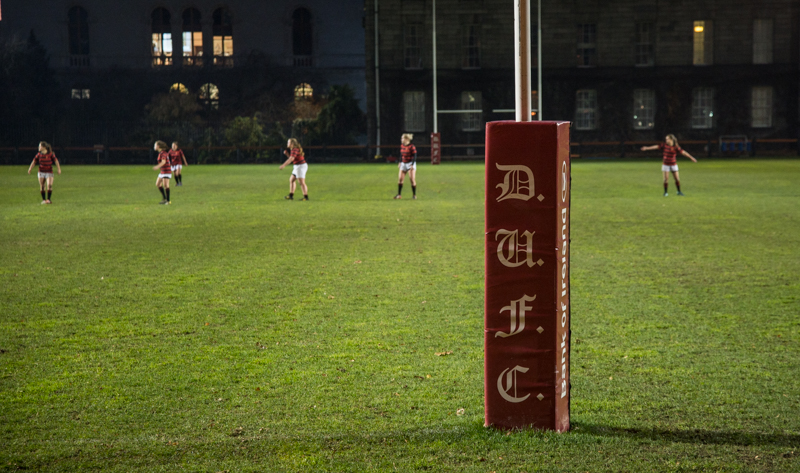After the disappointment of last weekend’s Leinster League final, Dublin University Football Club (DUFC) Women made the short venture to Clontarf for the first round of the Paul Cusack Cup, looking to get back to winning ways. In the end Trinity’s try scoring capabilities were too much for a physical Clontarf side, the away side leaving Clontarf with a 22-3 win.
The opening 10 minutes offered up little in terms of substantial attacking opportunities for either side. With a strong wind at their backs, Clontarf pinned Trinity into their own 22 by kicking deep, but Trinity were equal to the threat as the wings dropped slightly deeper and Niamh O’Kelly Lynch swept up in the midfield.
Trinity looked to use their significant speed advantage to get around a Clontarf defence that looked to pack the middle. The wind, however, stymied many of their ventures into the Clontarf half, resulting in a first quarter that was largely played in the middle of the pitch without either side really imposing themselves on the game.
On the 20-minute mark, however, the ball finally stuck. Following a strong drive in a scrum on Trinity’s left flank, the ball was fired out to the backs, finding its way to Alex Lynch at first centre. Lynch exploited an overlap on her right and popped it out to O’Kelly Lynch who produced a moment of brilliance to slalom through three covering tackles and touch down. Susanna Mollen duly stepped up to convert, to put Trinity 7-0 up.
Now chasing the game, Clontarf began to play with greater urgency, and out-half Angela Dwane opted to chip into Trinity’s lead by going for the posts after the visitors were pinged for offside.
With both teams now on the scoresheet, the game opened up, as both teams began to move the ball through the hands. Coupled with the 4G Clontarf pitch, this shift to a more expansive game suited DUFC’s pace-filled backline. They began to probe at the Clontarf defence with a myriad of runs and clever plays and cracked the hosts’ code on the stroke of half-time when Aine Castles sprinted away to touch down again for DUFC. Mollen converted once again to put Trinity 14-3 up heading into half-time.
The second half was a much cagier affair than the first. Clontarf, realising that another Trinity try would effectively end the game, looked to slow play down, while Trinity searched for a decisive score.
At every turn, though, DUFC had answers for the questions Clontarf posed of them in both phases of play, adroit in attack and well-drilled in defence. And when they turned possession substitute Honor MacNamara made good use of her kicking range, forcing the hosts to recalibrate their defence and opening up space out wide.
The second half progressed in this vein, tit for tat in the main and with few clear-cut opportunities. However, after holding Trinity under the cosh for the majority of the half, Clontarf were beginning to tire and grow increasingly frustrated by proceedings. More and more they ran into DUFC cul-de-sacs, and with the end in sight the visitors took control once more. Ill-discipline on the part of Clontarf gave MacNamara the chance at another three points, and she made no mistake.
The result was now inevitable, and Clontarf heads dropped. In the game’s dying moments O’Kelly Lynch surged through from full-back. Breaking through a number of weary would-be tacklers, she crossed the whitewash for her second of the game. From a tricky angle, MacNamara pulled her conversion wide, but it hardly mattered as DUFC marched on to the quarter-finals of the cup.
The result will also give DUFC a huge boost ahead of a trip to Belfield this Thursday to take on their old rivals in Colours. There, they will attempt to arrest a three-year losing streak against University College Dublin.







